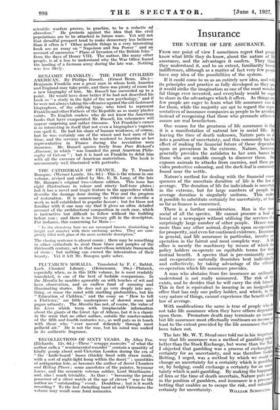Insurance
THE NATURE OF LIFE ASSURANCE.
FROM one point of view I sometimes regret that people know what little they do know, about the nature of life assurance, and the advantages it confers. They think they understand it, and to an extent, familiarity breeds indifference, although as a matter of fact very few people have any idea of the possibilities of the system.
If it could come to us as an entirely new idea, and with its principles and practice as fully developed as they ar it would strike the imagination as one of the most wonder ful things ever invented, and everybody would be eager to share in the advantages which it offers. As things are, few people are eager to learn what life assurance can do for them, while the majority are apt to regard the repre. sentatives of insurance companies as people to be avoided, instead of recognizing that those who persuade others to assure are real benefactors.
One reason for the greatness of life assurance is that it is a manifestation of natural law in social life. By leaving the time of death unknown, Nature puts us al into a position of uncertainty, and this commonly has the effect of making the financial future of those dependent upon us precarious in the extreme. Nature, however, generally provides the antidotes to her own banes for those who are sensible enough to discover them. She exposes animals to attacks from enemies, and then pro. vides protective colouring, and the dock-leaf is commo found near the nettle.
Nature's method for dealing with the financial eons& quences of the uncertain duration of life is the law of average; The duration of life for individuals is uncertain in the extreme, but for large numbers of people the average duration is singularly uniform. This make it possible to substitute certainty for uncertainty, at lust so far as finance is concerned.
There is a further consideration. Man is the most social of all the species. He cannot procure a loaf of bread or a newspaper without utilizing the services of s surprisingly large number of other people. Hence no, more than any other animal, depends upon co-operation for prosperity, and even for continued existence. Insurance in general, and life assurance in particular, involve co- operation in the fairest and most complete way. A life office is merely the machinery by means of which th policy holders co-operate on equitable terms for their mutual benefit. A species that is pre-eminently social and co-operative naturally flourishes best individually and collectively, by taking advantage of the efficient co-operation which life assurance provides. A man who abstains from fire insurance as ordinarily understood is not really uninsured. The risk of fire exists, and he decides that he will carry the risk himself. This in fact is equivalent to insuring in an insignificant office that has only one policy holder, and which, in the very nature of things, cannot experience the benefit of fig law of average. With modifications the same is true of people who do not take life assurance when they have others dependent upon them. Premature death may terminate an income, but life assurance most effectually continues an income, at least to the extent provided by the life assurance that has been taken out.
The late Mr. W. T. Stead once told me in his impetuo way that life assurance was a method of gambling ratl better than the Stock Exchange, but worse than the To I objected that gambling was a process of exchanging certainty for an uncertainty; and was therefore foe Betting, I urged, was a method by which we could change an uncertainty for a certainty which isang or, by hedging, could exchange a certainty for an on tainty which is anti-gambling. By making the happen of fires or the time of death uncertain,-Nature puts ns in the position of gamblers, and-insurance is a process betting that enables us to escape the risk, and substi
es






































 Previous page
Previous page